How much does it cost to put a fence around your property in Racine, WI?
October 25, 2024
How much does it cost to put a fence around your property in Racine, WI?

Putting up a fence around your property can bring privacy, security, and curb appeal, but it also comes with a variety of costs. The price of a fence installation in Racine, WI
depends on factors like the size of your lot, the type of fence you want, materials, and labor. This guide will break down the costs to help you understand how much you might need to invest in fencing your property.
Key Factors in Fence Installation Costs
Several elements influence the overall price of installing a fence, including:
1. Fence Size
2. Type of Fence
3. Material
4. Labor
5. Additional Features
Let’s dive into each to give you a clearer picture.
1. Fence Size
The length and height of the fence you choose will significantly impact the cost. Generally, the longer the fence, the more material and labor it requires, increasing the expense. Here’s an estimate of the cost for typical residential fences by linear footage:
100 linear feet: around $2,200
150 linear feet: approximately $3,500
300 linear feet: roughly $6,800
On average, most homeowners pay between $6 and $50 per linear foot, with the typical range for residential fence installation being about $22 per linear foot.
Costs by Lot Size
Your lot’s size also determines the length of fence required, impacting the cost:
1/8 acre (about 150 linear feet): $3,400
1/4 acre (roughly 220 linear feet): $4,800
1/2 acre (around 590 linear feet): $13,500
1 acre (about 1,100 linear feet): $23,500
2 acres (around 2,200 linear feet): $44,500
2. Type of Fence
The fence type you choose can affect not only aesthetics but also cost. A basic decorative fence is more budget-friendly, whereas a solid privacy fence, which uses more materials to fully block the view, will cost more per foot.
For example, a typical privacy fence averages around $33 per linear foot, whereas a decorative chain-link fence might range from $10 to $20 per linear foot.
3. Materials
Different materials come at varying price points and offer unique benefits:
Aluminum: $17–$85 per linear foot
Chain-link: $8–$38 per linear foot
Composite: $12–$42 per linear foot
Electric: $3–$4 per linear foot
Privacy (wood or vinyl): $25–$38 per linear foot
Steel: $18–$88 per linear foot
Vinyl (PVC): $15–$39 per linear foot
Wood: $11–$42 per linear foot
Wrought Iron: $28–$53 per linear foot
The material you choose influences not only the upfront cost but also the long-term maintenance requirements. For instance, wood requires periodic sealing or staining, while PVC or vinyl is low-maintenance but comes at a higher price per foot.
4. Labor
Labor usually makes up around 50% of your fence installation
costs. On average, labor for a basic fence installation costs around $1,500, though it can go higher for heavier materials or intricate designs. Labor rates also vary depending on your location—urban areas typically have higher labor costs than rural ones.
Hiring a professional installer is often worth the investment for a durable, well-installed fence that meets local regulations and won’t need frequent repairs.
5. Additional Features
Permits
Most cities and towns require a permit for fence installation, especially if the fence will be installed near property lines. Permit fees typically range from $20 to $60, but some contractors may include this in their pricing.
Gates and Other Add-Ons
If you need gates, expect an extra expense. A single side gate might cost between $150 and $1,100 based on its size and material, while a driveway gate can cost up to a few thousand dollars if automated.
Land Preparation
Preparing the land can also add to the budget. For example, grading for a level fence costs between $1,000 and $3,000, and tree or stump removal may add another $100 to $2,000 depending on the scope.
DIY vs. Professional Installation
If you have the tools and experience, you can save around $1,500 to $2,000 in labor costs by installing a fence yourself. Keep in mind that DIY projects often require additional time and planning, such as permit applications, equipment rentals, and material sourcing. Hiring a professional might cost more upfront, but their expertise can save you from costly errors and ensure the fence is installed according to local building codes.
Tips to Save on Fence Installation
Choose Budget-Friendly Materials: Chain-link or wood are often more affordable than aluminum or wrought iron.
Minimize Fancy Features: Complex designs, gates, or decorative caps add to the cost.
Plan Ahead: Installing a fence in off-peak seasons (like winter) can sometimes score you a better rate from contractors.
Get Multiple Quotes: Getting at least three quotes from reputable contractors can help you find the best value for your project.
Final Thoughts
Installing a fence is a significant investment, but the added privacy, security, and aesthetic appeal can make it worthwhile. From choosing the right material to hiring a reliable contractor, planning carefully can help you achieve the results you want without breaking the bank. With the right information, you’ll be able to make the best decision for your property, budget, and style.
Receive a Free Quote
Thank you for contacting us.
We will get back to you as soon as possible
We will get back to you as soon as possible
Oops, there was an error sending your message.
Please try again later
Please try again later
Location
1220 Mound Ave UNIT 500
Racine, WI 53404
racinefencecontractor@gmail.com
Call / Text
(262) 683-5661
Racine Fence Contractor
1220 Mound Ave Unit 500, Racine, WI 53404
(262) 683-5661
Find Racine Fence Contractor on Google
Areas We Serve
Services
Working hours
- Mon - Wed
- -
- Thu - Sat
- -
- Sunday
- -
© 2025